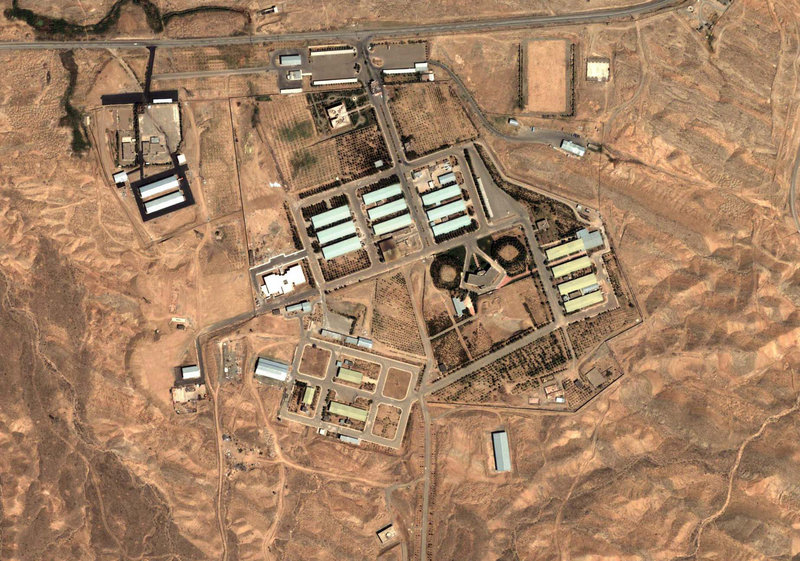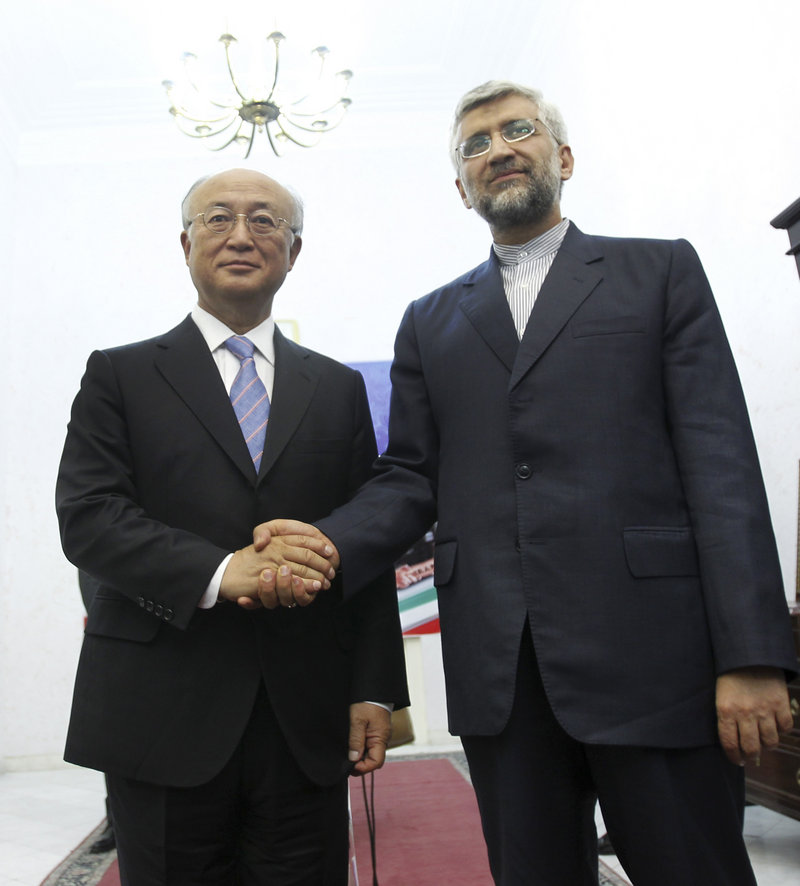TEHRAN, Iran – The head of the U.N. nuclear agency pushed Monday for a breakthrough pact with Iran to resume inspections into suspected secret atomic weapons work and possibly set in motion further dealmaking when envoys from Tehran and world powers gather later this week in Baghdad.
The mission by International Atomic Energy Agency chief Yukiya Amano — his first to Iran since taking the post in 2009 — raised speculation about greater flexibility by Iranian officials as they struggle to balance the blows from Western sanctions and their insistence never to abandon the country’s nuclear program.
But any Iranian cooperation — including possibly opening up a military site to U.N. inspectors — will carry reciprocal demands that the West may consider reaching too far, too soon.
Tehran has already signaled its goal before Wednesday’s talks: pressing the United States and Europe to roll back sanctions that have hit critical oil exports and blacklisted the country from international banking networks. The West’s opening gambit, meanwhile, may aim at one of Iran’s most prized advances: Its ability to make nuclear fuel.
A main concern is Iran’s production of uranium enriched to 20 percent, which is far higher than needed for regular energy-producing reactors but used in medical research. The United States and allies fear the higher-enriched uranium could be quickly boosted to warhead-grade material.
Iran denies it seeks nuclear arms and says its reactors are only for power and medical applications.
U.S. officials have said Washington will not backpedal from its stance that Iran must fully halt uranium enrichment. But speculation is increasing that the priorities have shifted to block the 20 percent enrichment and perhaps allow — at least for the moment — Iran to maintain lower-level nuclear fuel production.
Iranian officials could package such a scenario as a victory for their domestic audience. In Israel, it would likely be greeted with dismay and widen rifts between the Obama administration and Israeli officials who keep open the threat of military action against Iran’s nuclear sites.
Israeli Prime Minister Benjamin Netanyahu warned against concessions, saying world powers should make “clear and unequivocal demands” that Iran stop all of its nuclear enrichment activity.
“Iran wants to destroy Israel, and it is developing nuclear weapons to fulfill that goal,” Netanyahu said at a conference for civil servants in Jerusalem. “Against this malicious intention, leading world powers need to display determination and not weakness. They should not make any concessions to Iran.”
Saeed Jalili, Iran’s top nuclear negotiator, said his country hopes for a new beginning when the negotiations begin Wednesday.
“We had an agreement in Istanbul. That is the basis for the beginning of a new cooperation. We hope that the talks in Baghdad will be a kind of dialogue that will give shape to such cooperation,” Jalili said after arriving in Baghdad late Monday.
In Warsaw, Iran’s ambassador to Poland, Samad Ali Lakizadeh, said Monday that he believes the Baghdad talks offer a “very good chance and opportunity to solve many problems, provided that our rights are respected” — a reference to U.N. nuclear treaties that permit signatory nations, such as Iran, to enrich uranium.
Optimism for the Baghdad round was further boosted by the U.N. nuclear chief’s visit to Iran — just days after talks with Iranian envoys in Vienna that were described as making progress.
Amano is focused on getting Iran agreement to allow IAEA investigations of various high-profile Iranian sites, including the Parchin military complex southeast of Tehran, where the agency believes Iran in 2003 ran explosive tests needed to set off a nuclear charge. The suspected blasts took place inside a pressure chamber.
Iran has never said whether the chamber existed, but it describes Parchin as a conventional military site. Iran, however, has blocked IAEA inspection requests for more than four years.
A deal on Parchin could give Iran some leverage going into the Baghdad talks with a six-nation bloc comprising both friends and foes: the permanent U.N. Security Council members plus Germany.
“Nothing is certain in life, in diplomacy,” Amano told reporters before leaving Vienna. “But there has been good progress.
“I really think this is the right time to reach agreement,” he added.
Amano’s talks included Jalili as well as Iran’s foreign minister and other officials, among them the head of Iran’s nuclear agency, Fereidoun Abbasi.
Amano said his meetings were held amid a “good atmosphere,” but neither side mentioned Parchin in remarks to the media after Monday’s session, keeping their statements general.
Iranian lawmaker Heshmatollah Falahtpisheh told The Associated Press earlier Monday that Tehran will likely accept more inspections of Parchin “if it feels there is good will within the (IAEA).”
Send questions/comments to the editors.




Success. Please wait for the page to reload. If the page does not reload within 5 seconds, please refresh the page.
Enter your email and password to access comments.
Hi, to comment on stories you must . This profile is in addition to your subscription and website login.
Already have a commenting profile? .
Invalid username/password.
Please check your email to confirm and complete your registration.
Only subscribers are eligible to post comments. Please subscribe or login first for digital access. Here’s why.
Use the form below to reset your password. When you've submitted your account email, we will send an email with a reset code.